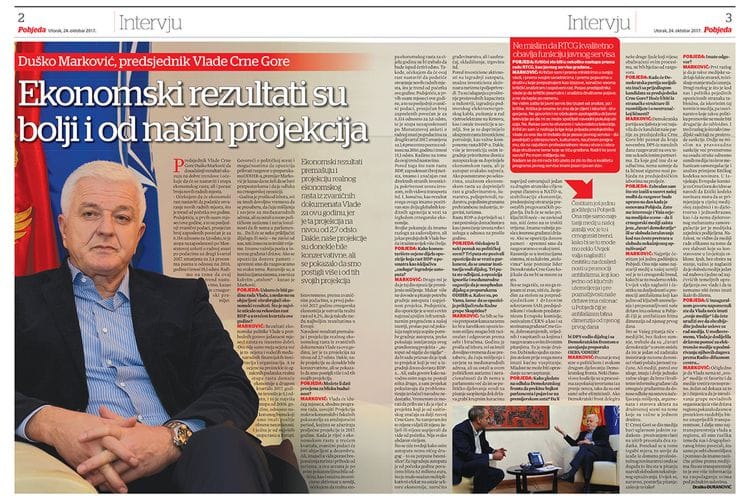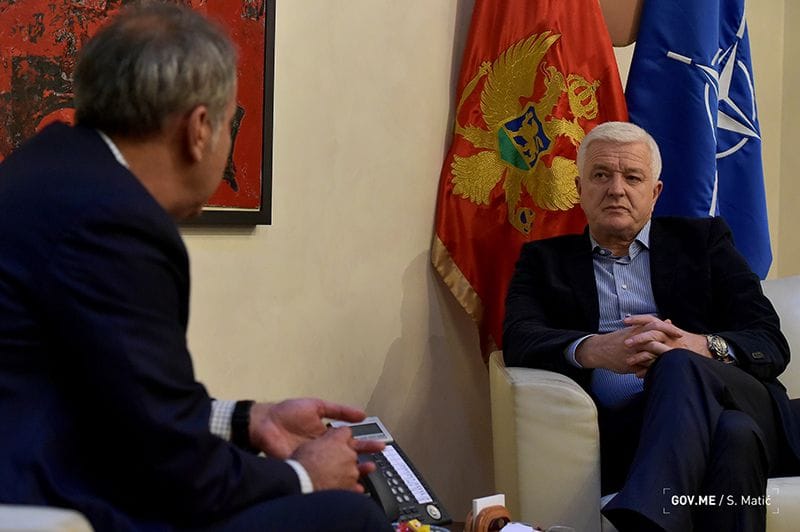- Government of Montenegro
PM Marković in interview with Pobjeda daily: Econo...
PM Marković in interview with Pobjeda daily: Economic results exceed our projections

 Podgorica, Montenegro (24 October 2017) -- Prime Minister Duško Marković gave an interview to the Podgorica-based Pobjeda daily on the occasion of the 73rd anniversary of the media outlet, in which he talked about the economic results of the Government and the situation on the political and media scene.
Podgorica, Montenegro (24 October 2017) -- Prime Minister Duško Marković gave an interview to the Podgorica-based Pobjeda daily on the occasion of the 73rd anniversary of the media outlet, in which he talked about the economic results of the Government and the situation on the political and media scene.
"Results of the Government's economic policy in the past almost 11 months are really very good. This is not just my assessment, but an assessment of international financial institutions and organisations as well. And these assessments came from exact data: the real growth rate of the domestic economy in the second quarter of 2017 was 5.1%, which is the highest rate since 2008, or after the boom we have had after the restoration of independence. And it is among the highest growth rates in Europe. In parallel, according to official data, in the first half of 2017, the Montenegrin economy achieved a real growth of 4.2%, which is also among the best in Europe. These results exceed the projection of real economic growth set out in the official government's documents for this year, as this projection is at a level of 2.7%. Our projections were somewhat conservative, but it turned out that we achieved more than we projected," said the Prime Minister.
He noted that the official data on economic growth in the third quarter will be published in December, and that given the increase in the number of tourist nights and arrivals, as well as the strong investment activity in the country, he expects the real rate of economic growth for 2017 not to be below 4%.
"I also expect that this growth will continue to encourage the creation of new jobs, which has been a trend since the beginning of the year. In the 8 months of the year, the average number of employees increased by 6,314 or 3.6%, and the unemployment rate, according to the Monstat Labour Force Survey's data for the second quarter of 2017, decreased by 2,4% compared to 2016, and amounts to 15.1%. We are working hard to keep this trend going. In addition to GDP growth, employment and the number of tourists, we also have a significant increase in foreign direct investment, coverage of import by exports, all types of transport, etc. And, finally, as a result of all this, we have a positive attitude of the two global credit agencies in relation to the Montenegrin economy's outlook. The figures show that we have reasons for satisfaction, but I, as the Prime Minister, want and ask for more and more," Prime Minister Marković explained.
What contributes to GDP growth?
The Prime Minister rejected the claims of some opposition politicians that the increase in GDP was only caused by the construction of the motorway, stressing that besides this project, there is an intensive investment activity in tourism and agriculture, investments in expanding production capacities in industry, construction of the undersea power cable, putting into operation of the Krnovo wind power plant, etc.
The Prime Minister underscored that he is pleased that part of the opposition changed their opinion on the highway, and that, at least, they do not question the necessity for its construction.
"I will remind you that part of the opposition in relation to the most important infrastructure breakthrough in our history has gone a long way from attempting to deny the necessity for constructing the highway, by attempting to ridicule this grandiose project – "the highway from nowhere to nowhere" - to admitting now that it a project that has led to the growth of GDP, although it is still under construction. But now they say that there is nothing more than that and they are trying to problematise the project by drawing out alleged shortcomings. In time they will have to accept that this is the project that is essential for further development of Montenegro. I do not mind that they did not see, or did not want, or could not see it from the very beginning. Not everyone is endowed with a vision," said the Prime Minister.
There is no discussion "at the table," but within institutions
Responding to the question about whether the opposition is expected to join the work of the Working Group of the Parliament of Montenegro, PM Marković pointed out that "he will not deal with the assumptions about who in the opposition milieu could be rational and accountable to themselves and voters," and that the Government is willing to talk.
"Whether someone will join or not will not depend on us and we will not waste time. We have more important work to do in the interest of citizens and the State. If the opposition comes to terms with it - we are ready to discuss each topic within the institutions of the system, and not "at the table," as proposed by the leader of Democratic Montenegro. I sit at the table with the US Vice-President and Secretary of State, President and High Representative of the European Commission, founder of CERN, as well as with hundreds of benevolent, worthy and educated citizens of Montenegro, with whom I discuss all life issues. That is my company. In order for someone to sit at my table, they must first have home education. Youth cannot be any justification for failure.
When asked about his readiness to talk with representatives of the Democratic Front, the Prime Minister said that a part of the coalition's politicians are facing prosecution for terrorism and money laundering.
"If the Democratic Front delegated some other people who are not linked to these processes, I would not run away from the conversation," Prime Minister Duško Marković underlined.
Asked about the presidential candidate of the Democratic Party of Socialists, the Prime Minister recalled that it was already agreed that his/her name would be known by the end of November.
"For whatever name to decide, there is no doubt that this person will certainly win the presidential elections in the spring," Prime Minister Marković noted.
Freedom and equality of media are Government's fundamental commitments
Asked whether the media in Montenegro are "watchdogs of democracy" or the freedom of expression often turns into a freedom of making false accusations, the Prime Minister said that tasks of the media should be to inform citizens quickly and efficiently and enable them to make decisions based on conflicting opinions, arguments and attitudes of social stakeholders on topics that are significant for the society.
"The first reason (for why this is not the case)] is that such media content is easier to create, it requires less effort and knowledge. Another reason is that in our country the politics of some opposition parties is of a tabloid kind, to use this term from the media, and the journalism that promotes such a policy cannot be different from the tabloid. And the third reason is that such media content does not produce sanctions. Here I am not referring to judicial sanctions, but primarily to the condemnation of the profession or the media themselves, through the mechanism of self-regulation and analysis of the application of the Code of Ethics of Journalists. The European Commission's Report on Montenegro states that the Code of Ethics of Journalists must be applied throughout the media community, both effectively and uniformly, and that there is no effective mechanism of self-regulation, because the media community is divided. Unfortunately, I do not see that the media are working efficiently to eliminate these weaknesses, as stated in the report. Nevertheless, regardless of the situation, it is important to underscore that the freedom of the media is one of the pillars and one of the strongest basic commitments of this government," said Prime Minister Duško Marković.
The Prime Minister was asked to clarify the criticisms he levelled at the Radio and Television of Montenegro implying that he was not satisfied with the work of the media.
"I am critical of the ministers in my Government and my associates, as well as the phenomena in society I recognise as challenges. After all, I analyse my own work very critically. The job of the Prime Minister is to critically observe and analyse social phenomena, not to tap on the shoulder. I do not see why the public broadcaster should be excluded from the analysis, and even criticism. Criticism is valuable for those who know how to appreciate and use it. I am being critical out of the concern the Prime Minister is entitled to - the public broadcaster need to produce top-quality educational, cultural and scientific programme and discuss social issues at the highest professional level. Is the public broadcaster doing this? In my opinion, no. I hope I will not be dissaproved for having a clear and public attitude about the quality of the public broadcaster's programme," said Prime Minister Duško Marković.
Congratulations on anniversary and anti-Fascism promotion
The Prime Minister congratulated the Pobjeda daily on its 73rd anniversary, noting that Pobjeda is today the oldest media outlet in Montenegro and the Montenegrin brand.
"Consistency in the promotion of anti-Fascism should be emphasised, which, as one of the key foundations and recognisability of our State, has been backed up by the Pobjeda daily, whose antifascism has been its important dimension since its first day," Prime Minister Duško Marković concluded.
PUBLIC RELATIONS SERVICE OF THE GOVERNMENT
